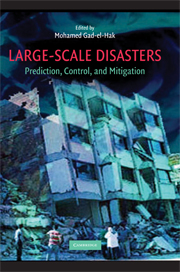Book contents
- Frontmatter
- Contents
- Preface
- About the editor
- List of contributors
- 1 Introduction
- 2 The art and science of large-scale disasters
- 3 Multiscale modeling for large-scale disaster applications
- 4 Addressing the root causes of large-scale disasters
- 5 Issues in disaster relief logistics
- 6 Large-scale disasters: perspectives on medical response
- 7 Augmentation of health care capacity in large-scale disasters
- 8 Energy, climate change, and how to avoid a manmade disaster
- 9 Seawater agriculture for energy, warming, food, land, and water
- 10 Natural and anthropogenic aerosol-related hazards affecting megacities
- 11 Tsunamis: manifestation and aftermath
- 12 Intermediate-scale dynamics of the upper troposphere and stratosphere
- 13 Coupled weather–chemistry modeling
- 14 Seasonal-to-decadal prediction using climate models: successes and challenges
- 15 Climate change and related disasters
- 16 Impact of climate change on precipitation
- 17 Weather-related disasters in arid lands
- 18 The first hundred years of numerical weather prediction
- 19 Fundamental issues in numerical weather prediction
- 20 Space measurements for disaster response: the International Charter
- 21 Weather satellite measurements: their use for prediction
- Epilogue
- Index
14 - Seasonal-to-decadal prediction using climate models: successes and challenges
Published online by Cambridge University Press: 20 October 2009
- Frontmatter
- Contents
- Preface
- About the editor
- List of contributors
- 1 Introduction
- 2 The art and science of large-scale disasters
- 3 Multiscale modeling for large-scale disaster applications
- 4 Addressing the root causes of large-scale disasters
- 5 Issues in disaster relief logistics
- 6 Large-scale disasters: perspectives on medical response
- 7 Augmentation of health care capacity in large-scale disasters
- 8 Energy, climate change, and how to avoid a manmade disaster
- 9 Seawater agriculture for energy, warming, food, land, and water
- 10 Natural and anthropogenic aerosol-related hazards affecting megacities
- 11 Tsunamis: manifestation and aftermath
- 12 Intermediate-scale dynamics of the upper troposphere and stratosphere
- 13 Coupled weather–chemistry modeling
- 14 Seasonal-to-decadal prediction using climate models: successes and challenges
- 15 Climate change and related disasters
- 16 Impact of climate change on precipitation
- 17 Weather-related disasters in arid lands
- 18 The first hundred years of numerical weather prediction
- 19 Fundamental issues in numerical weather prediction
- 20 Space measurements for disaster response: the International Charter
- 21 Weather satellite measurements: their use for prediction
- Epilogue
- Index
Summary
If climatic disasters such as severe droughts can be predicted a season or two in advance, their impacts can be considerably mitigated. With advances in numerical modeling capabilities, it has become possible to make such long-term forecasts, although their skill is quite modest when compared to short-term weather forecasts. This chapter reports on the current status of “dynamical climate prediction” (i.e., prediction of climate variations on seasonal-to-decadal time scales using comprehensive computer models of the climate system). Dynamical climate predictions are now competitive with empirical predictions made using statistical models based on historical data. Dynamical prediction skill is currently limited by errors in the formulation of numerical climate models, as well as by errors in the initial conditions. Increases in computational power, better model formulations, and new ocean observing systems are expected to lead to improved prediction skill in the future.
Introduction
Predictions, prognostications, and prophecies have always fascinated the human mind over the ages. In the early days of civilization, the ability to predict often connoted power and religious authority. Regardless of whether the predictions were right or wrong, they still affected people's lives. Predictions have lost much of their magical aura in the modern age, but they still play an important role in our lives.
- Type
- Chapter
- Information
- Large-Scale DisastersPrediction, Control, and Mitigation, pp. 318 - 328Publisher: Cambridge University PressPrint publication year: 2008
- 1
- Cited by



